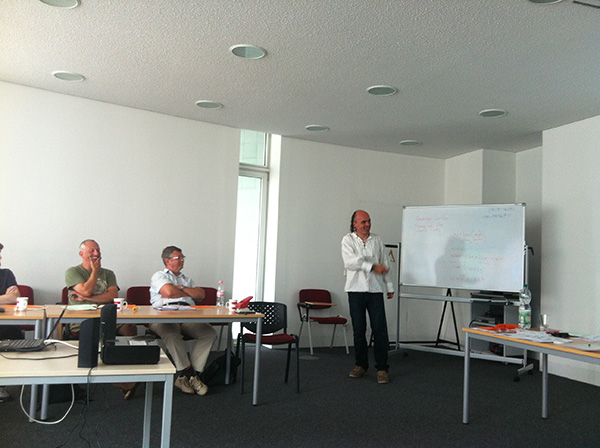Review by Jade Blue

Andreas Grundtvig’s session today was about ‘hedging’ (hedges are ‘words whose job is to make things fuzzier or less fuzzy’ Lakoff, G: 1972) in the English Language: how we use various degrees and types of politeness in different situations and the importance of this for students – particularly with intercultural groups. The workshop had a very ‘open’ quality to it and we, as participants, were able to share thoughts, experiences and ideas, and were encouraged to ask questions throughout. There was no extraneous ‘fluff’ as I’ve seen in some teacher development sessions – everything Andreas said was relevant or referred back to during the session, and he provided us with a lot of very useful links and resources.
Andreas began the session by talking about the Royal Baby. I was admittedly a little perturbed (having heard quite enough about it in the media) but also curious to see how the context would develop. The topic led to the child’s cultural and class background, and some very interesting facts about behaviour in the royal household – in terms of the type of language expected. The personal link here for Andreas (with his own rather multi-cultural background) was lovely to observe: I always enjoy a teacher bringing their own personal experience and character into the classroom.
We went on to discuss acceptable social behaviours and the principles of pragmatics (H. P Grice; 1975). Andreas had sent a survey to the participants prior to the session, questioning the appropriateness of various lexical phrases when emailing a range of recipients (boss, spouse, etc). It was interesting to note that there was a lack of ambiguity in the responses and most participants were in agreement about to whom they would write certain phrases, but it also highlighted the importance of context.
Andreas then talked about hedging and showed some advertising slogans as examples, as well as a BBC Hard Talk extract and the wonderful Monty Python grim reaper sketch – all very pertinent examples. We discussed politeness (in linguistics) and strategies for saving face and Andreas told us that if there’s one thing we should take away today it’s that ‘there’s no such thing as the British being more or less polite than anyone else, but the difference is in our understanding of politeness and the language that we use’. We identified examples of ‘Face saving strategies’ (Brown, P. & Levinson, S; 1978), both in the Monty Python sketch and some quotes about the Berlin wall, before going on to discuss ‘Impoliteness Strategies’ (Culpeper, J. 1996) which set out to ‘damage the speakers face’. Whilst it would have been nice to have more time to discuss and play with ideas, I felt the workshop had a good balance of the practical and theoretical.
Earlier in the workshop Andreas had talked about finding common ground between students as stimuli for peer discussion, and came back to this point (and a lovely exercise he shared for it) as a way of getting students talking in order to observe the type of language they use, highlighting the importance of helping students to decode the English language in varying situations. Linking back to his previous context of the Royal baby, he said ‘we grow up surrounded by different cultures but it is our responsibility to teach what is expected and what isn’t’.
All in all, the morning was a fantastically positive experience. The content of Andreas’ workshop was incredibly though-provoking and the conference was also a great opportunity to meet and get to know other ELT practitioners in the city.
- You can read more about my impressions of Andreas’ workshop, along with other thoughts and resources for EFL
- Visit Andreas Grundtvig along with his ideas and resources on his website
- A thank you from ELTABB e.V. to Berlin School of English for hosting this event
